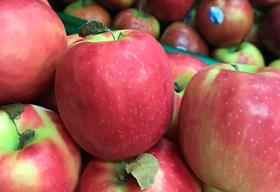
Club apples hit the topfruit market like a fleet of bright red sports cars crashing a late summer fete. Backed by large marketing budgets and flashy websites, they feel more like a clothing range than apple cultivars, indeed they may yet become so if Kanzi’s red suited marketing agents are anything to go by.
Pink Lady’s, Jazz and Kanzi have led the way, but with Royal Gala, Cox, Braeburn and Granny Smith still making up the bulk of British supermarket shelves, it’s not clear if they are trailblazers or anomalies. With consumption of topfruit relatively flat in volumes over the past few years, new club apple market could be in a dogfight for market share, competing for a slice of a static pie.
Pink Lady, which has seen UK volume growth of 8.7 per cent in the past three years, is perhaps an example of such a club variety stealing market share from the likes of Cox apples, which have suffered in recent years. Michelle Evans, group head of marketing at Coregeo says the targeted development of club varieties puts them in the driving seat going forward. “Inevitably, the appeal of these new apple varieties, which have been developed specifically to suit modern consumers’ demands, means that sales of long-standing fruit-bowl-favourites will suffer if their combination of attributes is less appealing than those offered by the fresh challengers.”
But some in the industry question why such a “club” should exist at all, with growers and consumers having to pay a premium for fruit that could just as well be sold without the razzmatazz. James Simpson, managing director of Adrian Scripps says club varieties have to justify those premiums to remain exclusive, delicately balancing costs with demand.
“Club varieties are a challenge, as are all new varieties in the market place. Often the draw back of club varieties are the proportionately higher cost associated with the production, usually in the form of royalties, tree costs, license fees etc.
“Large marketing budgets have to be paid for and invariably this is paid for by the grower, hence club varieties need to maintain a premium. When establishing club varieties in the market place, making them expensive makes them difficult to sell. The club “owners” and breeders of club varieties have to be prepared to invest.”
In line with their marketing aesthetic, Scripps says club varieties have to move fast and “confidently” to get a foothold in the market, as Pink lady and Jazz have. He notes that a variety like Kanzi represents the kind of challenges club brands face. “Kanzi is difficult to grow and struggling for support from the grower base. This is where the club concept has been tested, growers are not sure that there is benefit in the expense of establishing a club apple if the return due to poor yield and grade out is not there.”
English Apples & Pears' operations director Sarah Calcutt notes that traditional varieties are also improving too, meaning it is unlikely that they will be outmuscled by club apples any time soon. “Clearly a variety like Cox in terms of volumes are declining, but there will still be a place for traditional varieties.”
NEW PIPS ON THE BLOCK
Kissabel
“Going forward I’m really enthused by Kissabel red-flesh apples,” says Steve Maxwell, CEO of Worldwide Fruit. He is not the only one. The red-fleshed variety has been tipped to be the successor to Pink Lady in terms of success. Maxwell says: “We will have more trial sales of Kissabel in the UK this autumn, with volumes increasing over the next three years. The quality looks fantastic at the moment, it’s really exciting.”
Quality will be key for the variety, whose hype has set the bar high. “There is a lot of interest in red and pink fleshed varieties,” Simpson says. “Kissabel is one of a number coming to the market at this time. Again flavour will be the key, the novelty of coloured flesh is just a novelty, this has to be backed up with texture and flavour, many coloured flesh apples do not do this.”
Opal
Another new variety making ground is the bright yellow Opal variety, noted for its colour but also for its non-browning flesh, making it a handy one to slice or use prepared. James Simpson, who grows the variety on his Kent orchard says: “Opal is an excellent eating apple, flavour and texture is superb. The issue, as with all yellow-skinned varieties, is a hearts and minds exercise convincing British consumers that yellow doesn’t mean soft or over ripe. Modern varieties come in all colours and all have excellent flavour and texture.”
Smitten
Developed in New Zealand, the red and yellow fruit was bred from Royal Gala and Braeburn, mixed with two English varieties Fiesta and Falstaff. Smitten is gradually coming to the UK market, after being registered in 2010, with production ramping up a lot in America. “I’m really keen on Smitten as I think it tastes fantastic,” says Maxwell.






No comments yet